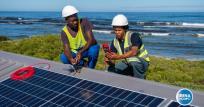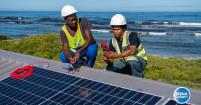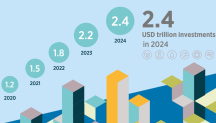

Energy Game Changers Step Up Climate Action
Newsletter
The International Renewable Energy Agency (IRENA) organised the "Game Changers Accelerating the Global Energy" session on 15 November at COP27, in support of the High-Level Champions and the Marrakesh Partnership for Global Climate Action.
COP 27’s theme “Together for implementation” reinforces one of the conference’s key priorities that there is a need to move from promises and announcements to concrete results and actions on the ground. In keeping with this theme, the event featured an inspiring group of game changers who demonstrated how the Climate Action Pathway on Energy can be brought to life through daring ideas, innovation, and energetic leadership.
In his opening remarks, Mahmoud Mohieldin, United Nations High-level Climate Champion for COP27, said, “Over 700 million people worldwide lack access to electricity and that three out of every four of them reside in Africa. But with the help of climate champions, the way we do business is changing. The share of renewables in the global electricity nexus has now grown from 18 per cent to 26 per cent.”
Speaking on the energy access crisis, Eduarda Zoghbi, Senior Advisor, Partnerships at Student Energy, said we must have a people-centered energy transition, where youth, women and indigenous communities are actively engaged and heard. “We must ensure young people play a pivotal role in achieving the UN SDG7 targets,” she added.
One of the key takeaways from the session is that, by accelerating mitigation efforts, ensuring that everyone has access to energy, and developing resilient energy infrastructure in the face of uncertainty, the energy sector can be better prepared to face the challenges posed by a world that has undergone massive climate change.
Siân Bradley, Head of Secretariat, Beyond Oil and Gas Alliance (BOGA), outlined the efforts made by her organisation to speed up the phase-out of oil and gas production. She noted that in order to fulfil the Paris Agreement, our energy systems must be radically changed. “With core members halting new oil and gas licensing rounds and setting an end date for existing production, and associate members talking other substantive steps to cut back supply, BOGO is truly a gamechanger.”
Emphasising the significance of innovation, Ghana’s Prince Essel, Co-Founder, Econexus Ventures Limited, said, there is no global energy transition without game changing solutions. “However, to accelerate this transition there is the need for catalytic funding to support actors, innovators and entrepreneurs working in the sector,” he added.
With a call to action for an equitable energy transition, Haija Samira Bawumia, Global Ambassador, Clean Cooking Alliance, said that, over the years, interventions to improve energy access have focused on electricity and have often neglected non-electricity household energy access. “Without increased efforts in ensuring this access, 2.1 billion people globally will lack access to clean cooking by 2030.”
Some of the countries most affected by climate change are also the ones with the least carbon emissions. From Barbados to Tuvalu, from the South Pacific to the Caribbean, small island states represent less than one percent of global greenhouse emissions and yet they face colossal annual losses because of global warming. Racquel Moses, CEO, Caribbean Climate-Smart Accelerator has been working actively toward facilitating collaboration of Caribbean Governments with the private sector for renewable energy projects. “We represent 28 countries, and our key goal is 90 per cent renewables for the region.”
Stressing the need to promote an interdisciplinary approach, and bringing together actors from the health and energy sectors, Dr Maria Neira, Director, Department of Environment, Climate Change and Health, World Health Organisation, said there are seven million premature deaths caused by exposure to air pollution, most of which come from the combustion of fossil fuels.
“It is unacceptable that such a substantial portion of the population is unable to access adequate health services due to lack of electricity in healthcare facilities. A person’s right to health should not be determined by where they were born, the right to universal health care is our global responsibility.”
In her concluding remarks, Elizabeth Press, Director of Planning and Programme Support, IRENA, said that it’s very clear that innovation and action is taking place in all quarters of the world. “There are results coming out and we can see that things are moving.” The decarbonisation of the energy sector requires accelerated action on a global scale to move the global energy transition forward and meet the 1.5°C climate goal.




